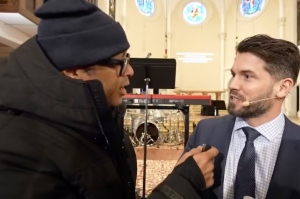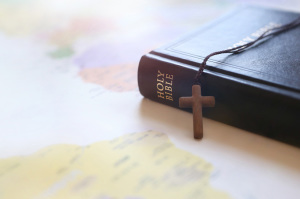Relinquishing bitterness: The key to healing

Imagine your heart as a container that holds your emotions, experiences and pain. Just like any container, there’s a limit to how much it can hold. When our hearts become filled with unresolved bitterness, there is no space left to receive healing or restoration. It becomes crucial, then, to hollow out that container, creating a void that can be filled with healing and restoration.
Taking responsibility for your bitterness is an integral part of the healing process. While you may not be at fault for the pain you’ve experienced, you are responsible for how to respond. The word “responsibility” itself alludes to “response-ability,” emphasizing our ability to respond. Taking responsibility is acknowledging that, while you may not be at fault or liable for your situation, you’re responsible for choosing how you respond. Bitterness may sway your heart to fixate on blaming those that inflicted your pain, but healing comes from focusing on personal response.
Blame seduces pain to remain. It lures you into the illusion that blame provides a solution when, in reality, it just marinates in the problem. The “blame game” merely assigns who’s at fault or liable for an outcome, but it doesn’t absolve you of responsibility. Liability and responsibility are two different things, and understanding the difference is essential for relinquishing your suffering. Liability is the legal or moral obligation of being held accountable for consequences. Responsibility is the opportunity to act independently and make decisions. While you may not be liable for the situation, you’re always responsible for how you respond to it. The difference between liability and responsibility is obligation versus opportunity! Responsibility overpowers liability.
Imagine you just bought your dream car. As you’re cruising through an intersection, a distracted, uninsured driver that’s scrolling through social media crashes into your new ride. As a result of their negligence, you’re injured. The other driver is to blame for the accident and should be held accountable. However, blaming them shouldn’t be your main priority. You’re still responsible for getting medical treatment and responding to the aftermath. For example, it’s responsible to have liability coverage in your auto policy to help cover damages caused by the uninsured driver at fault. You hold the power of how you respond to problems outside of your control.
Hear me loud and clear! I am not saying that you’re responsible for the misfortunes and tragedies that happen, out of no fault of your own. For example, you’re not responsible for monstrous category 5 hurricanes or meteoric earthquakes that obliterate entire cities and take countless lives. You’re not responsible for suffering a devastating miscarriage of that precious baby you’ve prayed many years and tears for. It’s not your fault that some bloodthirsty, deranged psychopath walked into a school, fully armed for war, to massacre innocent children. And you’re not liable or responsible for a drunk driver killing your loved one in a hit-and-run. Nor am I liable, responsible, or at fault for my grandmother’s building crumbling apart in the middle of the night.
But here I am, because I’m responsible for my response, just as you’re responsible for yours.
You are not liable for something when it’s not your fault. But you are always responsible for your response, even when it’s not your fault. Blame points to the problem, but responsibility points to solutions. Responsibility goes beyond fault and focuses on the response. It’s about taking ownership of your healing journey, regardless of who is to blame. Fault is never a valid justification to forfeit your responsibility of faithfulness to healing.
Remember, blame only assigns a name to your pain. Using your energy to name someone to blame won’t bring peace. Blame only leads to bitterness and shame that resentment will claim. Will your response lead to your resentment or restoration? Will you allow bitterness to contain your pain and put a lid on your future? Or will you release resentment to make room for the promise of restoration?
God isn’t concerned with how much we can surrender to our own strength. Rather, He’s far more interested in the amount of strength we’re willing to surrender to Him. That’s why Psalm 73:26 (ESV) claims, “My flesh and my heart may fail, but God is the strength of my heart and my portion forever.” God’s desire is for you to surrender your limited human strength and allow His divine power to work in and through you! It’s time to rename your pain.
This is an excerpt from, “Uncollapsable Soul: How Do You Endure a Broken Heart Without Crushing Your Spirit?” by Mike Noriega, published by Genesis Publishing House with permission.
Mike Noriega is a spokesperson, author and public speaker. Through his personal journey with loss following the aftermath of the Surfside Condo Collapse, Noriega has become an inspirational voice for both his family and community, sharing their experience, struggles and unwavering faith through the colossal tragedy. He has shared several platforms with notable figures such as Florida Governor, Ron Desantis; Miami Dade Mayor, Daniela Levine Cava; Pastor Rich Wilkerson Jr. of VOUS Church and many others. Noriega’s mission is to guide and empower others in their journey of hope, healing and restoration, offering the wisdom of an “uncollapsable” soul, even in the face of heartbreak. For more information on his book, grieving process and journey to faith, visit https://mikenoriega.com/ or follow him on Instagram, Twitter, Facebook and Tik Tok. For more information on his book, grieving process and journey to faith, visit https://mikenoriega.com/ or follow him on Instagram, Twitter, Facebook and Tik Tok.??



























